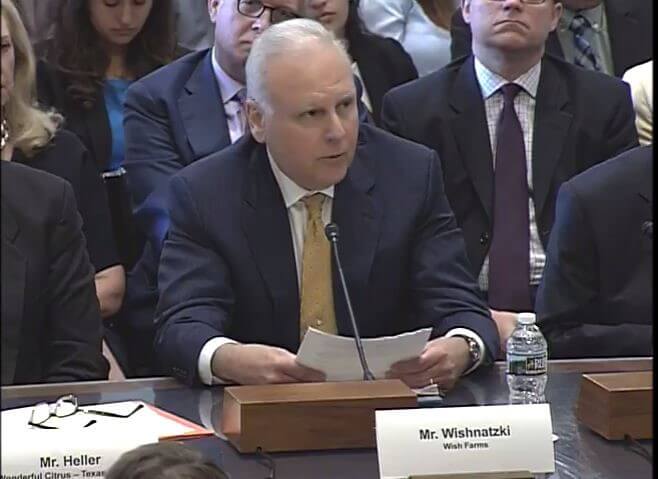Expert Florida Berry Grower Joins Talks on the Next Farm Bill: Technology & Innovation in Specialty Crops
PLANT CITY, Fla. (July 20, 2017) – Gary Wishnatzki, owner of Wish Farms® – Florida berry grower and a leader in the U.S. agricultural industry – spoke in Washington D.C. at the Public Hearing: The Next Farm Bill: Technology & Innovation in Specialty Crops as an industry adviser. Wish Farms has provided high-quality produce since 1922, and now specializes in strawberries, blueberries and blackberries.
The House Agriculture Committee Chairman, K. Michael Conaway, said, “Support for specialty crop producers is an essential part of the farm bill…. As we approach the next farm bill, our goal is to ensure that the policy we craft serves the needs of all our producers, including those in the specialty crop industry.”
Most specialty crop growers agree that the availability of labor is the greatest challenge that their industry faces. The rising cost of labor is merely a secondary problem. Soon, even Mexico will not have enough labor to harvest the crops that are being grown in Mexico.
When asked what that meant for American farms, Gary Wishnatzki, Owner of Wish Farms and Co-Founder of Harvest CROO Robotics, stated “It means that we will be in a full-blown crisis if we stick to the status-quo. All is not lost, yet. But, the industry needs to aggressively fund technology companies to find labor-replacement solutions to the many crops that we grow.”
Currently, the U.S. food industry has no other option but to rely on foreign-born labor to do the essential jobs needed to get our crops harvested. The majority of farmworkers come from other countries, particularly Mexico.
Upon announcing the hearing, Chairman Conaway issued the following statement:
“Specialty crop production is a pivotal and growing sector of our agriculture industry. As we look at the farm bill through the lens of the current farm economy, innovation and technology will remain essential for farmers and ranchers to continue producing more food and fiber with fewer resources. I look forward to hearing from our witnesses on ways to build upon public-private partnerships and innovation to benefit specialty crop producers.”
The future of our food is dependent on technology. But, food cultivation needs help in the present. Although “H2A is not a sustainable solution, it is a short-term way to bridge the gap until robotics in agriculture become ubiquitous,” argues Wishnatzki. Therefore, during the discussion of The Next Farm Bill: Technology & Innovation in Specialty Crops, he continued to urge members of the Ag Committee to be advocates for meaningful H2A visa reform.
Mr. Wishnatzki stated, “Innovation will be the key to maintaining our nation’s ability to feed itself. Our representatives should fight for investments in technology and research in the specialty crop sector, while also providing a better way to access labor in the short-term.”
You are invited to watch The Next Farm Bill: Technology & Innovation in Specialty Crops meeting here.















